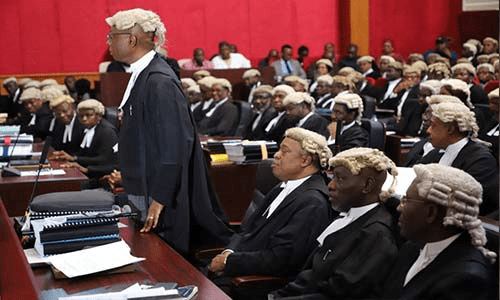By Martin Cole-
The Nigerian Presidential Election Petitions Tribunal is getting ready to consider the Peoples Democratic Party and the Labour Party’s request for a live broadcast of its proceedings.
It requested that both the petitioners and respondent in the suit to settle and decide on their objections, including the motion on notice filed by the PDP and its presidential candidate, Atiku Abubakar, requesting that the presidential tribunal proceeding, which began on Monday, to be broadcast live
The head of the five-man panel promised the resumed pre-hearing session that the application for a live broadcast of the proceedings “will be considered together with the other issues.”
In a May 5 appeal, the PDP and Atiku argued that televising the court proceedings would increase transparency and promote citizens’ faith in the judicial process.
The opposition party, the Peoples Democratic Party, and its presidential candidate, Atiku Abubakar, are contesting Bola Tinubu’s victory in the February 25 presidential election on the grounds that the Independent National Electoral Commission failed to electronically upload the election results at the time the winner was declared.
Electoral body, INEC, Tinubu, and the APC are the petition’s respondents (CA/PEPC/05/2023).
FThe Labour party and its candidate, Peter Obi, are also contending the results of the governroship elections in Lagos State the ex-Lagos State governor did not receive at least one-quarter of the votes polled in the Federal Capital Territory election.
The PDP and Atiku expressly asked the court for an order directing the court’s registry and the parties on processes for admission of media practitioners and their equipment into the courtroom in their application for a live telecast of the court proceedings.
The application was made by their legal team, led by Chris Uche, SAN, on the grounds that the case before the court was a dispute over the outcome of the presidential election held on February 25, and thus a matter of national significance and public interest.
They also claimed that because this was a one-of-a-kind electoral dispute with a peculiar constitutional component, it was a matter of public interest in which millions of Nigerians were stakeholders with a constitutional right to observe the proceedings
They further claimed that because this was a one-of-a-kind electoral dispute with a peculiar constitutional component, it was a matter of public interest in which millions of Nigerians were stakeholders with a constitutional right to observe the proceedings.
He said, “An integral part of the constitutional duty of the court to hold proceedings in public is at discretion to allow public access to proceedings either physically or by electronic means.
“With the huge and tremendous technological advances and developments in Nigeria and beyond, including the current trend by this court towards embracing electronic procedures, virtual hearing and electronic filing, a departure from the rules to allow a regulated televising of the proceedings in this matter is in consonance with the maxim that justice must not only be done but must be seen to be done.
“Televising court proceedings is not alien to this court, and will enhance public confidence.”
There is public concern for transparency in a highly charged case in which there is plenty of scepticism by the complainants and many ordinary Nigerians who are apprehensive that a strictly behind close doors trial could make it easy for a whitewash verdict.
No election has ever been overturned by the Nigerian Supreme Court, and there have been many rumours that sitting judges have already been bought for an extremely large price by the wealthy president-elect or his representatives.
There is no evidence to support that conspiracy theory, but despite some past rulings by the court in the past which has unseated presiding governors after an election, many Nigerians ar distrusting of the integrity of the Nigerian court to deliver a genuine verdict supported by the facts.
A number of analysts believe the irregularities witnessed during the 2023 elections were not pervasive enough to alter the election outcome, but the failure of INEC to publish the results as they were coming in, has sparked suspicion.
INEC said its system was affected by network issues interfered with by hackers.
In the first motion brought by the counsel of president=elect Tinubu- Lateef Fagbemi (SAN)- Tinubu is seeking to strike out some paragraphs in Atiku’s petition where he raised fresh issues, which he said were not pleaded in the original petition, while replying to his preliminary objection.
Atiku had contended that Tinubu did not meet the constitutional threshold and is constitutionally debarred from contesting for the office of President of the Federal Republic of Nigeria because he forfeited a sum of $460,000 “as substituted by a competent authority, a sequel to a compromise agreement, and for narcotics-related crime (proceeds of crime) in the United States District Court, Northern District of Illinois Eastern Division, Judge A. Nordberg.”
Atiku also claimed that Tinubu failed to disclose in his Form EC9 that he holds dual citizenship in Nigeria and Guinea, having voluntarily acquired the citizenship of the Republic of Guinea.
Atiku had further submitted that the grounds for non-qualification are competent, being a constitutional issue.
Tinubu, in his second motion, also asked the tribunal to dismiss the entire petition seeking the nullification of the election for being a breach of the Electoral Act, 2022, filed by Atiku at the pre-hearing stage for being incompetent.
Tinubu also contended that the petition was “vague, non-specific, nebulous, inchoate, incompetent, imprecise, fraught with ambiguity; and liable to be struck out by the court.”
The court case is expected to be one of the most fierce of such contested in history.
It will allege fraud, irregularities, and insist there are other constitutional reasons why Tinubu cannot be the president of Nigeria.




